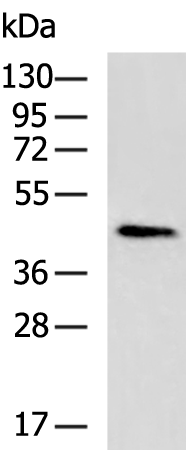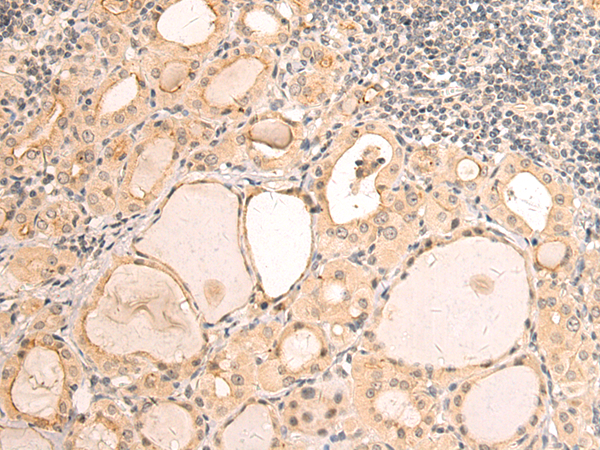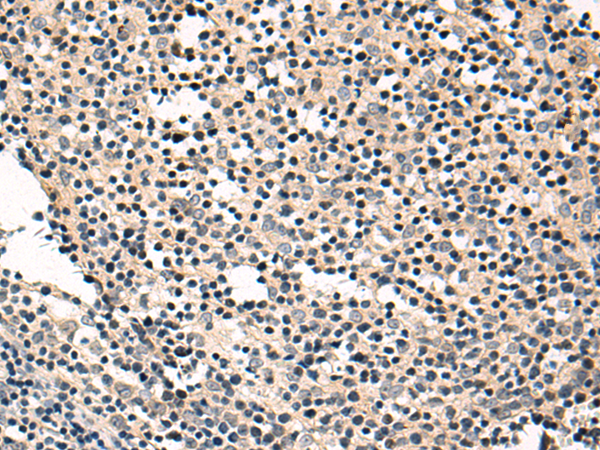


| WB | 咨询技术 | Human,Mouse,Rat |
| IF | 咨询技术 | Human,Mouse,Rat |
| IHC | 1/50-1/200 | Human,Mouse,Rat |
| ICC | 技术咨询 | Human,Mouse,Rat |
| FCM | 咨询技术 | Human,Mouse,Rat |
| Elisa | 1/5000-1/10000 | Human,Mouse,Rat |
| Aliases | GIG1; CYR61; IGFBP10 |
| WB Predicted band size | 42 kDa |
| Host/Isotype | Rabbit IgG |
| Antibody Type | Primary antibody |
| Storage | Store at 4°C short term. Aliquot and store at -20°C long term. Avoid freeze/thaw cycles. |
| Species Reactivity | Human, Mouse, Rat |
| Immunogen | Fusion protein of human CCN1 |
| Formulation | Purified antibody in PBS with 0.05% sodium azide and 50% glycerol. |
+ +
以下是关于CCN1抗体的3篇参考文献概览:
1. **"CCN1/CYR61 mediates critical signals for endothelial cell survival and angiogenesis"**
*作者:Babic et al.*
摘要:研究利用特异性CCN1抗体通过免疫沉淀和Western blot技术,验证了CCN1在内皮细胞存活和血管生成中的作用,表明其通过整合素信号通路调控细胞凋亡抵抗。
2. **"Targeting CCN1 reduces fibroblast growth and fibrosis in myocardial infarction models"**
*作者:Jun et al.*
摘要:通过中和性CCN1抗体在小鼠心梗模型中的干预实验,发现抗体可显著抑制心脏成纤维细胞活化及胶原沉积,提示CCN1抗体在抗纤维化治疗中的潜力。
3. **"CCN1 promotes tumorigenesis through AKT/mTOR signaling in hepatocellular carcinoma"**
*作者:Liu et al.*
摘要:研究使用CCN1单克隆抗体进行免疫组化分析,证实肝癌组织中CCN1高表达,并揭示其通过激活AKT/mTOR通路促进肿瘤生长,抗体检测结果支持其作为预后标志物的价值。
CCN1 antibody targets the Cellular Communication Network Factor 1 (CCN1), also known as CYR61 (Cysteine-Rich Angiogenic Inducer 61), a matricellular protein belonging to the CCN family (CCN1-6). CCN1 is involved in diverse cellular processes, including proliferation, adhesion, migration, differentiation, and apoptosis, by interacting with integrins, heparan sulfate proteoglycans, and growth factor receptors. It plays critical roles in development, tissue repair, angiogenesis, inflammation, and tumorigenesis. Dysregulation of CCN1 is linked to pathologies such as fibrosis, atherosclerosis, rheumatoid arthritis, and cancers (e.g., breast, liver, and glioblastoma).
CCN1 antibodies are essential tools for detecting and studying the protein's expression, localization, and function in vitro and in vivo. They enable techniques like Western blotting, immunohistochemistry (IHC), immunofluorescence (IF), and flow cytometry. Researchers use these antibodies to explore CCN1's dual roles in cancer—promoting tumor progression via angiogenesis and metastasis or suppressing it through senescence and apoptosis, depending on context. Commercial CCN1 antibodies are typically raised in rabbits or mice against specific epitopes, with validation in knockout models or siRNA-treated samples to ensure specificity. Applications span basic research, biomarker discovery, and therapeutic target validation. However, challenges include cross-reactivity with other CCN proteins due to structural homology, emphasizing the need for rigorous validation. Major suppliers include R&D Systems, Abcam, and Santa Cruz Biotechnology.
×